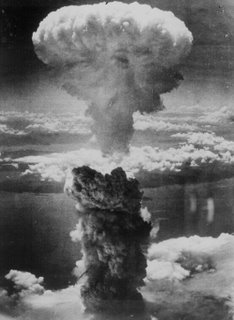 It is becoming apparent that North Korea did carry out an underground nuclear test last night making it the eighth nation to possess nuclear weapons. Exactly what actions will be taken by the United States, South Korea, Japan, China and the United Nations is unclear at this time.
It is becoming apparent that North Korea did carry out an underground nuclear test last night making it the eighth nation to possess nuclear weapons. Exactly what actions will be taken by the United States, South Korea, Japan, China and the United Nations is unclear at this time.What is clear is the U.S. policy that failed to prevent this from happening. Empty-threats-as-a-substitute-for-diplomacy has been the hallmark of the Bush administration’s policy towards North Korea. Joshua Marshall has a good summary of how we arrived at this point:
We'll need to wait a few more hours for confirmation. But initial signs suggest that the US picked up the seismic signature of the underground nuclear
test the North Koreans are claiming to have carried out. We've been pretty sure for some time that the North Koreans had developed a nuclear capacity. This would not only confirm that assumption, but the decision to conduct the test will be interpreted as a sign of belligerence that will send ripples throughout the region, probably first through Japanese rearmament.
For the US this is a strategic failure of the first order.
The origins of the failure are ones anyone familiar with the last six
years in this country will readily recognize: chest-thumping followed by failure
followed by cover-up and denial. The same story as Iraq. Even the same story as
Foley.
North Korea's nuclear program has been a problem for US presidents
going back to Reagan, and the conflict between North and South has been a key
issue for US presidents going back to Truman. As recently as 1994, the US came
far closer to war with North Korea than most Americans realize.
President Clinton eventually concluded a complicated and multipart
agreement in which the North Koreans would suspend their production of plutonium in exchange for fuel oil, help building light water nuclear reactors (the kind that don't help making bombs) and a vague promise of diplomatic
normalization.
President Bush came to office believing that Clinton's policy amounted
to appeasement. Force and strength were the way to deal with North Korea, not a mix of force, diplomacy and aide. And with that premise, President Bush went
about scuttling the 1994 agreement, using evidence that the North Koreans were
pursuing uranium enrichment (another path to the bomb) as the final straw.
Remember the guiding policy of the early Bush years: Clinton did
it=Bad, Bush=Not whatever Clinton did.
All diplomatic niceties aside, President Bush's idea was that the North
Koreans would respond better to threats than Clinton's mix of carrots and
sticks.
Then in the winter of 2002-3, the US prepared the invade Iraq, the
North called Bush's bluff. And the president folded. Abjectly, utterly, even
hilariously if the consequences weren't so grave and vast.
Threats are a potent force if you're willing to follow through on them.
But he wasn't. The plutonium production plant, which had been shuttered since
1994, got unshuttered. And the bomb that exploded tonight was, if I understand
this correctly, almost certainly the product of that plutonium uncorked almost
four years ago.
So the President talked a good game, the North Koreans called his bluff
and he folded. And since then, for all intents and purposes, and all the
atmospherics to the contrary, he and his administration have done essentially
nothing.
Indeed, from the moment of the initial cave, the White House began
acting as though North Korea was already a nuclear power (something that was
then not at all clear) to obscure the fact that the White House had chosen to
twiddle its thumbs and look the other way as North Korea became a nuclear power. Like in Bush in Iraq and Hastert and Foley, the problem was left to smolder in cover-up and denial. Until now.
Hawks and Bush sycophants will claim that North Korea is an outlaw
regime. And no one should romanticize or ignore the fact that it is one of the
most repressive regimes in the world with a history of belligerence, terrorist
bombing, missile proliferation and a lot else. They'll also claim that the North
Koreans were breaking the spirit if not the letter of the 1994 agreement by
pursuing a covert uranium enrichment program. And that's probably true too.
But facts are stubborn things.
The bomb-grade plutonium that was on ice from 1994 to 2002 is now
actual bombs. Try as you might it is difficult to imagine a policy -- any policy
-- which would have yielded a worse result than the one we will face Monday
morning.
Talking tough is great if you can make it stick and back it up; it is
always and necessarily cleaner and less compromising than sitting down and
dealing with bad actors. Talking tough and then folding your cards doesn't just
show weakness it invites contempt. And that is what we have here.
The Bush-Cheney policy on North Korea was always what Fareed Zakaria
once aptly called "a policy of cheap rhetoric and cheap shots." It failed. And
after it failed President Bush couldn't come to grips with that failure and
change course. He bounced irresolutely between the Powell and Cheney lines and
basically ignored the whole problem hoping either that the problem would go
away, that China would solve it for us and most of all that no one would
notice.
Do you notice now?
No comments:
Post a Comment